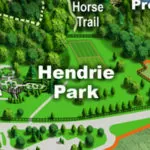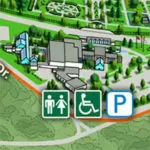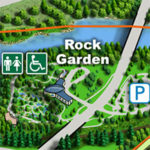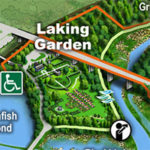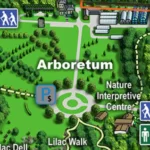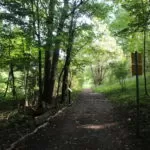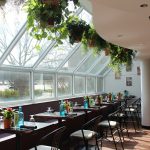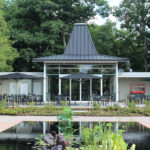| Membership | Price (+HST) |
|---|---|
| Single | $85/year |
| Single Plus | $120/year |
| Family | $130/year |
| Family Plus | $175/year |
| Contributing | $300/year |
| Supporting | $600/year |
| Sustaining | $1,000/year |
| Benefactor's Circle | $2,500/year |
| Director's Circle | $5,000/year |
| President's Circle | $10,000/year |
Nature Trails
Nature Trails at Royal Botanical Gardens
RBG’s nature sanctuaries feature more than 27 km of nature trails in Burlington & Hamilton. There are four main trailheads, as well as two canoe launch sites. The trails traverse challenging landscapes and as such are classed as wilderness trails with most trails containing hill sections with steep grades.
Learn More
Royal Botanical Gardens’ +2100 acres is dominated by +2000 acres of nature sanctuaries enveloping the western end of Lake Ontario. The lands have a history of other uses associated the area as an immigration and shipping and are being restored through ongoing conservation projects. The properties and activities are regulated by the Royal Botanical Gardens Act and supporting bylaws.
These lands form a Nodal Park within the Niagara Escarpment World Biosphere Region and the heart of the Cootes to Escarpment Ecopark System. With more than 750 native plant species, 277 types of migratory birds, 37 mammal species, 14 reptile species, 9 amphibian species and 68 species of Lake Ontario fish, the area is an important contributor to ecosystems that span international borders.
Royal Botanical Gardens acknowledges the long history of First Nations and Métis People in the Province of Ontario, and pays respect to the Six Nations of the Grand River Territory and the Mississaugas of the Credit First Nation, the holder of the Treaty with the Crown for these lands. The land we steward is within the traditional territories of the Haudenosaunee, Anishinaabe, and Huron-Wendat Nations. Learn more about First Nations botanical uses within the Niagara Escarpment Biosphere Region.
Urgent Reminder: Wildlife Feeding Prohibited
Feeding wildlife along the trails is resulting in long-term damage to these important nature sanctuaries and their inhabitants.
RBG has a strict policy prohibiting the feeding of wildlife, with enforcement regulated by the City of Burlington’s By-law Enforcement Agency. If you witness wildlife feeding, please report it to Burlington By-Law Enforcement. We appreciate your engagement and look forward to working with the community to create a safe habitat for all wildlife residing at RBG.
Trail Systems
RBG’s nature sanctuaries are home to 3 trail systems spreading between Hamilton, Burlington and Dundas.
Hamilton
Cootes Paradise Trails
Established in 1927 for its significance as a migratory bird stopover, Cootes Paradise is RBG’s largest and most diverse sanctuary at over 600 hectares. The area features a 320-hectare river-mouth marsh, 16 creeks and 25 kilometres of shoreline.
Burlington
Hendrie Valley Trails
This 100-hectare sanctuary is centred on the Grindstone Creek Valley. The area features forested slopes with towering trees, a 60-hectare river-mouth marsh complex and four creeks.
Dundas
Escarpment Property Trails
Niagara Escarpment World Biosphere Region is represented here by several properties forming a 110-hectare, three-kilometre ribbon along the Escarpment edge.
Trail User Notes
Updated monthly
Trail Closures and Interruptions
Cootes Paradise:
- Friday, April 4, 2025: Due to a City of Hamilton fire hydrant replacement on Old Guelph Road, the washrooms at the Arboretum will be unavailable from 10:30 a.m. to 5:00 p.m.
- A temporary 1 day closure of Princess Point will occur in April/May to facilitate a controlled burn – date weather dependent.
Hendrie Valley:
- There are no trail interruptions at this time.
- Hendrie Valleys Grindstone Marsh Boardwalk will have periodic user interruptions this winter as deck sections are replaced. Notifications will be found at the trail entrances.
Escarpment Properties:
- Rock Chapel parking lot has reopened for the season (March 21, 2025).
For Your Safety
- While using our nature trails, please note that all use is at your own risk. Most of our trails are hilly and the trail surfaces are natural soil. Consider your footwear as during winter surfaces can be icy or muddy depending on the weather.
- Please stay on the marked nature trails to avoid trampling regenerating shrubs and trees or buried roots of understory plants such as trilliums.
- The nature trail system is considered closed during extreme weather event notifications from Environment Canada.
- Cross country skiing and mountain bikes/fat bikes are not allowed as our trails are not designed to accommodate these activities.
- Skating is available at Princess Point when ice conditions of Cootes Paradise Marsh permit. Conditions can change rapidly and will be posted onsite and on social media. View latest update.
- Please be aware ticks, including those carrying Lyme Disease, are found throughout the Hamilton/Burlington area and are active at temperatures above 0°C. Protect yourself by staying on marked trails. RBG does not accept ticks for testing. For inquiries regarding ticks, please contact the Region of Halton or City of Hamilton Public Health.
Admission & Parking
Paid parking is in effect for all trail users arriving by car, with parking meters available at all trailhead parking lots. Proceeds from the parking fees go directly toward the maintenance of these lots as well as stewardship of the natural areas.
A 12-month parking pass is issued with the purchase of an RBG Membership. Please place parking pass on the dashboard of your vehicle for the duration of your visit. Neglecting to do so may result in a parking ticket. Members still required to pre-reserve parking at the Arboretum during bloom season.
Open Parking Lots:
- Arboretum – 16 Old Guelph Rd
- Laking Garden Upper Lot – 1249 Spring Garden Rd/Plains Rd
- Cherry Hill – 1101 Plains Rd W.
- Rock Garden – 1210 York Blvd
- Princess Point – 335 Longwood Rd
- Westdale – 85 Oak Knoll Dr
- Valley Inn – 1220 Spring Garden Rd
- Rock Chapel – 318 Rock Chapel Rd
Closed Parking Lots
- Laking Garden – Lower lot (1221 Spring Gardens Road) – closed seasonally
- Unsworth Ave Parking lot (1171 Unsworth Ave.) – closed indefinitely
Trail Features
Anishinaabe waadiziwin
Trail Celebrating Indigenous Plants
Native plants provided Indigenous peoples with almost all of life’s essentials. Starting in the Arboretum near the Nature Interpretive Centre, this trail developed in partnership with the Misssisaugas of the Credit First Nation explores plants used by the Anishinaabe peoples, and their connections to culture, language, ecology and history.
Impacts of Wildlife Feeding on RBG Trails
Wildlife in RBG’s nature sanctuaries have a problem — and the problem is overfeeding. A recent study discovered that the frequency and amount of feeding wildlife in hotspot areas such as Hendrie Valley Nature Sanctuary is doing far more harm than good.
Skating on Cootes Paradise
Princess Point provides access to a skating area across Cootes Paradise. Ice is measured each Friday (before end of day), and updated at the on-site signage, here, and on our Facebook page. Please note: weather changes quickly, and so upon arrival the ice may not be in the same condition as listed. Please use caution, take time to read the signage, and follow the listed guidelines.
View conditions and learn more at the link below.
Hiking the trails is free, but maintaining them isn’t
Royal Botanical Gardens (RBG) is the largest botanical garden in Canada, a National Historic Site, and registered charitable organization with a mandate to bring together people, plants and nature.
Resources
Introduction
Preparing For Your Hike
Trailheads
After Your Hike
Inclement Weather
Trail User Etiquette
Trail User’s Code
Upon entering the nature trails you are making a pledge to respect the environment and fellow visitors. These lands are Canada’s biodiversity hotspot, set aside at the head of Lake Ontario for environmental protection, open for environmental education and passive recreation only. While walking our trails, it is important to remember that you are a visitor in someone else’s home, and that your impact will be multiplied over by 500,000 other visitors. Environmental protection bylaws are posted at each trailhead. Please follow them and play a role in protecting and restoring the area for future generations.
Trail Use Bylaw Restrictions
The properties and activities are regulated by the Royal Botanical Gardens Act and supporting bylaws.
- Runners are not permitted.
- Pets must remain leashed at all times. Please clean up after your dogs and leave waste trailhead garbage receptacle.
- Bicycles are prohibited.
- Motorized vehicles are prohibited.
- Horseback riding is prohibited.
- Picking or collecting plants or wildlife is prohibited.
- Feeding the wildlife/birds is prohibited. Feeding wildlife results in long-term damage to these important nature sanctuaries and their inhabitants.
- Cross-country skiing is prohibited due to the hilly topography.
- Ice skating is restricted to Cootes Paradise in the area adjacent to Princess Point.
- Use of drones is prohibited under RBG bylaw and further regulated by NavCanada.
Trail Conditions
The 5 main trailheads provide access to a combination of wider walking trails and narrow earthen backwoods footpaths. Surfaces include packed earth, crushed stone, asphalt and boardwalks; many sections are steep and hilly. Ice builds up on hills and floodplains during winter and can make trails slippery, “icers” are recommended. During spring thaws and after rains earthen trails become muddy.
Trail Accessibility
Trail widths are about 1m with natural material surfaces. Grades at Rock Chapel and Princess Point accesses areas are relatively flat at 1% grade, while the Arboretum and Hendrie Valley Trails have maximum grades of 25%. Most trails have elevation changes of 20m. Trail cross slope angles do not exceed 5%. The Desjardins Trail accessed from Princess Point is a flat multiuser paved trail, managed by the City of Hamilton on RBGs behalf and is part of the Trans Canada Trail network.
Special Protection Areas
While the property spans +2100 acres, urban encroachment has left few true sanctuary areas for sensitive wildlife and bird species. To ensure that all species have an opportunity to persist 20 percent of the property remains without trails. For the visitor, next to these areas there are observation points and interpretive signage to help you appreciate the significance of these unique spaces.
For Those Afloat
Experience the area by canoe or kayak on your own, or as part of our organized canoe tours. Princess Point is the best place from which to launch your craft. The east side as a dock to launch from, while the west side has a sand beach-like area that can also be used. Please remember that paddling is prohibited in posted areas during the nesting season (May and June) to protect vulnerable wildlife. Motorized boats are prohibited at all times, excluding for Gardens’ research purposes.
Liability Statement
Royal Botanical Gardens assumes no responsibility for loss of, or damage to property, personal injury or mishap, all activities are at the risk of the participant. Trail structures and adjacent trees are inspected regularly for visitor safety. Parking lots are not monitored, please do not leave any valuables in your car.
Trail Frequently Asked Questions
Are the trails free to access?
Trail access points are varied as are the costs. Many access points are walk in and accessible by bike or transit and as a result are free. Parking fees do apply at metered lots for those arriving by car. Proceeds from the memberships and parking fees go towards the maintenance of these access locations as well as stewardship of the natural areas.
NOTE: Time-ticketed parking applies to access the Arboretum during bloom season (typically May/June)
Though hiking the trails is free, maintaining them and the nature sanctuaries (home to over 1,000 species) requires significant investment. Please consider support RBG’s conservation efforts with a donation. Learn more at rbg.ca/donate
Which trails are the most accessible / stroller-friendly?
Trail widths are about 1m with natural material surfaces.
Grades at Rock Chapel and Princess Point accesses areas are relatively flat at 1% grade, while the Arboretum and Hendrie Valley Trails have maximum grades of 25%. Most trails have elevation changes of 20m. Trail cross slope angles do not exceed 5%.
The Desjardins Trail accessed from Princess Point at Cootes Paradise is a flat multiuser paved trail, managed by the City of Hamilton on RBGs behalf and is part of the Trans Canada Trail network.
Can I bring my dog on the trails?
Dogs are welcome in the nature sanctuaries so long as they remain on-leash, on-trail, and are cleaned up after.
Keep the nature sanctuaries fun and safe for everyone, comply with local bylaws, and help with our conservation efforts by keeping your dog leashed. If you see someone with an off-leash dog on the trails or at the arboretum, call Animal Services to report the incident to the by-law enforcement branch.
- Hamilton: 905-574-3433
- Burlington: 905-335-3030
Are bikes permitted on the trails?
For safety, maintenance, and conservation reasons, biking is not permitted on RBG’s trail systems. Many of RBG’s main trailheads include bike racks for your convenience.
Do you have canoes available for rent?
RBG does not lease out the canoes used in our camps and programs. Check with your local outdoor equipment provider for rentals or sign up for our Paddling in Paradise programs available in the summer months. Learn more at rbg.ca/paddle
What do I do if I find a distressed animal?
As RBG is not a wildlife handling organization, should you find an injured or distressed animal in the nature sanctuaries, please contact the appropriate animal control authority (Hamilton: (905) 574-3433, Burlington: (905) 335-3030). They may request that you stay with the animal to keep eyes on its whereabouts until help arrives, and may contact RBG for access assistance.
Young animals such as Fawns (Young Deer): If you encounter a young animal such as a fawn alone in any natural space, rest assured they are likely not abandoned. Mothers leave their little ones hidden while in search of food. Give them space, its mother will be back within the next day ready to move to a new spot. If the fawn has not moved in several days and its ears are curled down due to dehydration, contact your local animal control authority.
Can I fish on RBG’s properties?
Fishing is permitted at trail access points to the water as well as by non-motorized boat. However as the area largely used by spawning fish it is subject to seasons articulated in the OMNRF fishing regulations. Remember the lands along the water contain many sensitive plant species.
Is ice skating available in the winter?
Princess Point provides access to a skating area across Cootes Paradise. Ice is measured each Friday (before end of day), and updated at the on-site signage, here, and on our Facebook page. Please note: weather changes quickly, and so upon arrival the ice may not be in the same condition as listed. Please use caution, take time to read the signage, and follow the listed guidelines. Check rbg.ca/skating in the winter for posted ice thickness / safety notes.
More Ways to Experience the Nature Sanctuaries
Birding
Royal Botanical Gardens provides easy access to some of the most diverse birding in Ontario.
Paddling
See the marsh and its inhabitants from a new perspective as your guide leads you from one shore of Cootes Paradise to another.
Skating
Princess Point provides access to a natural skating area across Cootes Paradise.

